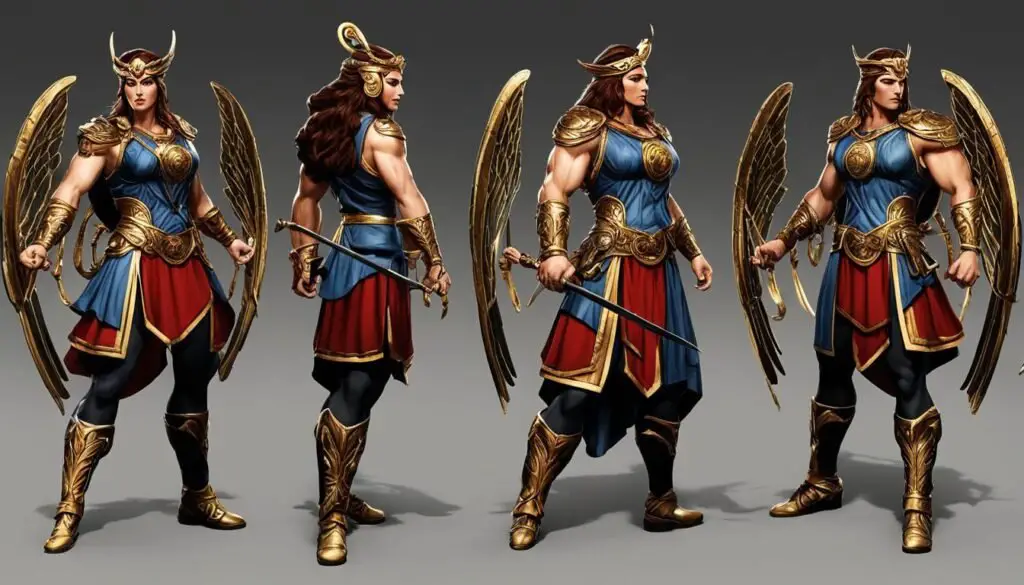In Greek mythology, Metis was a Titaness and a goddess of wisdom, prudence, and deep thought. She was known for her intelligence and cunning nature, and she played a significant role in the stories and myths of ancient Greece.
Metis was often associated with wisdom, smart advice, and strategic planning. She was respected for her ability to provide wise counsel and guidance, making her a valuable advisor and counselor to the gods.
Metis’ most well-known role was as the wife and counselor of Zeus, the King of the Gods. She played a crucial role in helping Zeus overthrow his father, Cronus, during the Titan War. Her wisdom and strategic planning were instrumental in Zeus’ rise to power and the establishment of his reign as the King of the Gods.
Key Takeaways:
- Metis was a Titaness and a goddess of wisdom in Greek mythology.
- She played a significant role as the advisor and counselor to Zeus during the Titan War.
- Metis’ wisdom and strategic planning were instrumental in Zeus’ overthrowing of Cronus and establishing his rule as the King of the Gods.
- She was often associated with intelligence, cunning nature, and deep thought.
- Metis’ legacy continues to be celebrated in ancient and modern culture, with her name being given to celestial bodies.
The Origin and Family of Metis
Metis, the wise Titaness in Greek mythology, had a fascinating origin and belonged to a distinguished family. She was one of the Oceanids, the beautiful daughters of Oceanus and Tethys. Born before the Olympian gods, Metis was among the esteemed Titans who ruled during a time of divine supremacy.
Metis was not alone in her divine lineage. Her siblings included other Oceanids, who were nymphs associated with the seas, as well as Potamoi, the river gods. Together, they formed a powerful and influential family that played significant roles in Greek mythology.
As for her parents, Metis was fortunate to be born to Oceanus and Tethys, two renowned figures in ancient Greek mythology. Oceanus was the divine embodiment of the world’s oceans, while Tethys personified the fresh water sources of the world, such as rivers, streams, and springs. Their lineage and domain tied them closely to the natural elements that shaped the world.
With her divine heritage and close relationship with the Oceanids and river gods, Metis was an esteemed member of her family. Her origins and family ties would play a crucial role in shaping her destiny and the impactful roles she would fulfill in Greek mythology.
The Roles of Metis

Metis, the wise and cunning goddess, played multiple significant roles in Greek mythology. She was revered as the goddess of wisdom, embodying intelligence, prudence, and strategic thinking. Metis served as the trusted counselor and advisor to Zeus during the critical events of the Titan War.
As the counselor of Zeus, Metis provided him with invaluable advice and strategic planning, guiding him in his quest to overthrow his father Cronus and claim his rightful place as the King of the Gods. Her wisdom paved the way for Zeus’ ultimate victory and the establishment of his reign.
Metis’ role as the goddess of wisdom went beyond her counsel to Zeus. She embodied the essence of intelligence, prudence, and cunningness, making her highly revered in Greek culture. Her wisdom and cunning were instrumental in shaping the destiny of the gods and the outcomes of crucial events.
Throughout the Titan War, Metis demonstrated her keen intellect and ability to strategize, contributing to the success of the Olympian gods. Her role as the goddess of wisdom was not only restricted to her counsel to Zeus but also extended to her influence on other divine matters.
Metis’ wisdom and strategic thinking positioned her as a key figure in Greek mythology, encompassing both her role as the advisor to Zeus and her embodiment of wisdom itself. Her legacy as the goddess of wisdom continues to inspire and fascinate us to this day.
Metis and Zeus
Metis had a close relationship with Zeus. In some versions of the myth, she was considered Zeus’ first wife, while in others, she was his secret lover. As his counselor and advisor, Metis played a crucial role in Zeus’ rise to power. Her wisdom and advice helped Zeus free his siblings from their father’s stomach, and she continued to support him in his rule as the King of the Gods.
Throughout their union, Metis and Zeus shared a deep bond rooted in intellect and strategic thinking. Metis’ wise counsel guided Zeus in crucial moments, enabling him to navigate complex situations and overcome challenges. Her contributions were instrumental in shaping Zeus’ reign as the ruler of Mount Olympus.
As a manifestation of their relationship, Metis played a significant role in Zeus’ victory over his father, Cronus, during the Titan War. With her cunningness and intelligence, Metis forged a plan to help Zeus free his siblings, who were swallowed by Cronus. This pivotal act showcased the strength of Metis and Zeus’ partnership in fulfilling their divine destinies.
Although Metis’ fate took an unexpected turn, her impact on Zeus’ life and reign was profound. The metaphoric marriage between Metis and Zeus represented the merging of wisdom and power, allowing Zeus to become the formidable leader he was destined to be.
Metis and Athena

Metis, the wise Titaness, played a crucial role in the birth of Athena, the goddess of wisdom, courage, and strategic warfare. According to Greek mythology, when Metis was pregnant with Athena, a prophecy emerged that predicted their child would be more powerful than Zeus, the King of the Gods.
In an attempt to prevent the prophecy from becoming a reality, Zeus made the fateful decision to swallow Metis whole. However, unbeknownst to Zeus, Metis had already crafted armor, a spear, and a shield for Athena before being swallowed. Inside Zeus’ head, Athena was born, fully grown and wearing the armor her mother had created. This extraordinary birth made Athena the first motherless goddess.
This myth illustrates the indomitable spirit and wisdom that Athena embodies, inherited from her mother, Metis. As the goddess of wisdom, Athena became known for her strategic thinking, intellectual prowess, and wise counsel. The deep wisdom and cunning nature of Metis were passed down to Athena, making her one of the most revered and formidable goddesses in Greek mythology.
Metis and Hera
Metis and Hera, the queen of the gods, had a complex relationship. In some versions of the myth, Hera was jealous of Metis and her close bond with Zeus. It is believed that Metis’ role as Zeus’ advisor and lover caused friction between Zeus and Hera. However, Metis’ fate of being swallowed by Zeus before giving birth to Athena left Hera as the sole queen of the gods, erasing any threat Metis posed to her power.
Metis’ Cunning and Wisdom

Metis, the wise Titaness, was revered for her intelligence, cunningness, and cleverness in ancient Greece. She possessed remarkable trickster powers and had the ability to shape-shift, allowing her to gain different perspectives and make wise decisions.
Her exceptional wisdom and cunningness earned her a place of high regard among the Greeks. These qualities were often compared to those of the legendary hero Odysseus, known for his cunning tactics in the Trojan War.
The Athenians especially admired Metis’ embodiment of wisdom and cunningness, considering it an esteemed characteristic of their own character. Her influence in ancient Greek culture continues to be celebrated.
Her legacy as a symbol of wisdom and strategic thinking lives on, inspiring people to approach challenges with cunning and intelligence.
Metis in Ancient Greek Philosophy

Metis as the Embodiment of Prudence and Wise Counsel
Metis, the wise Titaness, held great significance in ancient Greek philosophy. As the embodiment of prudence and wise counsel, she became a revered deity by the 5th century BC. The Greek word “metis” denoted a quality that combined wisdom and cunningness, which perfectly encapsulated Metis’ essence.
Ancient philosophers, particularly the Stoics, allegorized Metis as the embodiment of “prudence.” Through her cunning and strategic nature, Metis epitomized the virtue of prudent decision-making. Her wisdom and counsel were regarded as vital in navigating the complex challenges of life.
Inherited as a symbol of prudence, Metis continued to influence philosophical thought even during the Renaissance. She represented the wisdom that comes from experience and the ability to think critically, making her an enduring figure in the realm of philosophy.
Applying Metis’ Wisdom in Everyday Life
The concept of Metis and her embodiment of prudence and wise counsel can be relevant to our modern lives. Embracing the qualities associated with Metis allows us to make informed decisions, think strategically, and navigate challenges wisely.
By incorporating Metis’ wisdom into our daily routines, we can enhance our problem-solving skills, develop astute judgment, and make sound decisions. Furthermore, drawing inspiration from Metis can help us approach situations holistically, seeing beyond immediate circumstances to consider long-term consequences.
The Enduring Influence of Metis
Metis’ influence extends far beyond ancient Greek mythology and philosophy. Today, her legacy remains commemorated in celestial bodies such as the main-belt asteroid (9 Metis) and Jupiter’s moon (Metis). These acknowledgments serve as a testament to her lasting impact on human thought and culture.
Metis’ embodiment of prudence and wise counsel continues to inspire individuals to seek wisdom, make thoughtful choices, and approach life with strategic thinking. Her legacy serves as a reminder of the importance of intelligence, cunningness, and deep thought in our pursuit of personal growth and success.
Metis in Mythology

According to Hesiod’s account in Theogony, Metis was an Oceanid nymph and one of the 3000 daughters of Oceanus and Tethys. She played a significant role in the Titanomachy, the war between the Titans and the Olympian gods.
During the Titanomachy, Metis aided Zeus in freeing his siblings from Cronus’ stomach, contributing to the victory of the Olympians. However, after the war, Zeus pursued Metis and eventually swallowed her. Some variations of the myth suggest that Metis concocted a potion to induce Cronus to vomit out his swallowed siblings, further enhancing her role in the success of the gods.
Metis’ involvement in the titanomachy showcases her strategic planning and intelligence, highlighting her as a valuable asset to Zeus’ cause. Her role in this epic battle cemented her significance within Greek mythology and her influence on the outcome of major conflicts.
Stay tuned for more exciting insights into the world of Greek mythology in the upcoming sections.
Alternative Versions of the Metis Myth

While the traditional version of the Metis myth portrays Zeus as the father of Athena, there are alternative versions that offer intriguing twists to the story. One such version suggests that it was the Cyclops Brontes, rather than Zeus, who fathered Athena before Metis was swallowed. This variation adds an unexpected dynamic to the parentage of Athena, raising questions about her divine lineage.
In the Orphic tradition, Metis takes on a different role altogether. Here, she is enthroned as a primal cosmogenic force, alongside Eros, the god of love. This interpretation presents Metis as a powerful deity, responsible for the creation and harmony of the cosmos. It illustrates her significance beyond her association with wisdom, highlighting her influence in the fundamental aspects of existence.
Furthermore, in Plato’s writings, Metis’ legacy extends to her offspring. Porus, the son of Metis, is recognized as the god of creative ingenuity. This representation emphasizes Metis’ role as a source of inspiration and invention, attributing her with the ability to foster creative expression and innovation.
These alternative versions of the Metis myth demonstrate the flexibility and complexity of Greek mythology. They offer diverse perspectives on the character and significance of Metis, expanding our understanding of her influence in the ancient world. Whether portrayed as the mother of Athena, a primal cosmogenic force, or the mother of the god of creative ingenuity, Metis continues to captivate our imagination and challenge our interpretations of her mythological role.
Ancient and Modern Legacy of Metis

Metis, the wise Titaness in Greek mythology, has left a lasting legacy that can be seen in various aspects of ancient and modern culture. Her influence extends to our exploration of the world, both on Earth and in space.
One notable tribute to Metis is the naming of Metis Island in Antarctica. This remote and majestic island stands as a testament to the enduring impact of her mythological presence.
Metis has also been immortalized in the celestial realm. An asteroid in the main asteroid belt between Mars and Jupiter bears the name 9 Metis. This celestial body serves as a reminder of Metis’ significance in Greek mythology and her enduring legacy in the vastness of space.
In addition to the asteroid, a moon of Jupiter has also been named after Metis. This moon, simply known as Metis, orbits the gas giant and further solidifies her place in scientific discovery and exploration.
Metis’ ancient legacy lives on through these terrestrial and celestial landmarks, showcasing her continued influence and impact on human culture and exploration. From the frozen reaches of Antarctica to the depths of space, the name of Metis endures as a symbol of wisdom, intellect, and an enduring presence that transcends time and boundaries.
Conclusion
In Greek mythology, Metis, the wise Titaness, was revered as a goddess of wisdom, prudence, and deep thought. She played a crucial role as Zeus’ counselor and advisor during the Titan War and was instrumental in the birth of Athena, the goddess of wisdom and strategic warfare. Metis’ intelligence, cunningness, and trickster powers earned her admiration in ancient Greece, where her qualities were often associated with the heroic figure of Odysseus.
Metis’ legacy extends beyond her mythical tales. Celestial bodies bear her name, such as Metis Island in Antarctica, the main-belt asteroid 9 Metis, and the moon of Jupiter, Metis. These celestial honors serve as a lasting tribute to Metis’ significance in Greek mythology and her enduring associations with wisdom and strategic planning.
In summary, Metis’ role as a goddess of wisdom, her contributions to Zeus’ rise to power, and her influence in the birth of Athena make her a fascinating figure in Greek mythology. Her cunningness, intelligence, and trickster powers continue to captivate the imagination, while her legacy lives on in the names of celestial bodies and her associations with wisdom and strategic thinking.
FAQ
Who is Metis in Greek mythology?
Metis is a Titaness and a Greek goddess of wisdom, prudence, and deep thought.
What is the origin and family of Metis?
Metis is one of the 3000 daughters of Oceanus and Tethys, known as the Oceanids. Her siblings include other Oceanids and Potamoi, the river gods.
What roles did Metis play in Greek mythology?
Metis played multiple roles, serving as the goddess of wisdom, counselor and advisor to Zeus during the Titan War, and strategic planning.
What was the relationship between Metis and Zeus?
Metis was considered Zeus’ first wife and served as his advisor and lover. She played a crucial role in Zeus’ rise to power.
How was Metis connected to Athena?
Metis was the mother of Athena. During her pregnancy, Zeus swallowed Metis, fearing the prophecy that their child would be more powerful than him. Athena was later born fully grown from Zeus’ head.
What was Metis’ relationship with Hera?
In some versions of the myth, Hera was jealous of Metis and her close bond with Zeus. Metis’ fate of being swallowed by Zeus erased any threat she posed to Hera’s power.
What were Metis’ qualities and powers?
Metis was known for her intelligence, cunningness, and cleverness. She possessed trickster powers and the ability to change shape, making her highly regarded in ancient Greece.
How is Metis portrayed in Greek philosophy?
Metis became the embodiment of prudence and wise counsel in Greek philosophy, symbolizing wisdom and the combination of intelligence and cunningness.
What was Metis’ role in Hesiod’s account?
Metis played a significant role in the Titanomachy, helping Zeus free his siblings from Cronus’ stomach and providing wise counsel during the war.
Are there alternative versions of the Metis myth?
Yes, alternative versions suggest that the Cyclops Brontes was the father of Athena before Metis was swallowed, and in the Orphic tradition, Metis was enthroned as a primal cosmogenic force.
What is the ancient and modern legacy of Metis?
Metis is honored in various ways, such as Metis Island in Antarctica, a main-belt asteroid (9 Metis), and a moon of Jupiter named after her, reminding us of her significance in Greek mythology.




